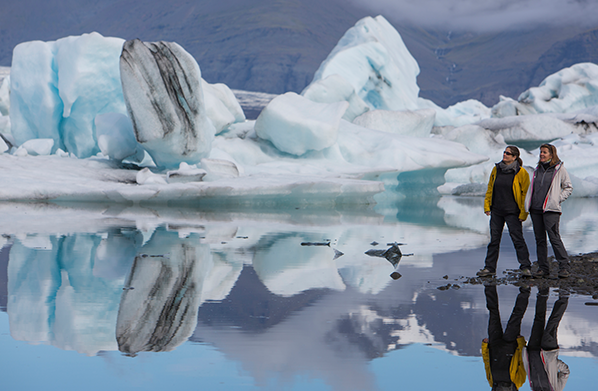Feminist glaciology!
No, don't laugh–it's for real!
The National Science Foundation has spent $412,930 to fund a study that produced this research paper: "Glaciers, Gender, and Science: A Feminist Glaciology Framework for Global Environmental Change Research."
Really! Click the links if you don't believe me!
That $413,000 of your tax dollars paid for this groundbreaking scientific conclusion:
Ice is not just ice.
And that's just the tip of this iceberg of a paper, published in January 2016 in the journal Progress in Human Geography. The 10,417-word paper also contains some dazzling samples of postmodernist gobbledygook, such as:
Feminist and postcolonial theories enrich and complement each other by showing how gender and colonialism are co-constituted, as well as how both women and indigenous peoples have been marginalized historically (Schnabel, 2014). Feminist glaciology builds from feminist postcolonial science studies, analyzing not only gender dynamics and situated knowledges, but also alternative knowledges and folk glaciologies that are generally marginalized through colonialism, imperialism, inequality, unequal power relations, patriarchy, and the domination of Western science (Harding, 2009).
and:
Crucially for feminist glaciology, feminist political ecology argues for the integration of alternative ways of knowing, beyond diverse women’s knowledges to include – more broadly – the unsettling of Eurocentric knowledges, the questioning of dominant assumptions, and the diversification of modes and methods of knowledge production through the incorporation of everyday lived experiences, storytelling, narrative, and visual methods (Harris, 2015). This inclusion of alternative knowledges and narratives alongside analysis of colonialism and inequality, such as race relations (Mollett and Faria, 2013), fits squarely into more recent feminist political ecologies that increasingly go ‘beyond gender’. This means that the research builds on ‘a history of boundary-breaking ideas [that] makes possible the present-day spaces where feminist geographers explore power, justice, and knowledge production, ideas that encompass but also surpass a focus on gender’ (Coddington, 2015: 215).
According to a press release from the University of Oregon, where lead researcher Mark Carey is a professor, the paper grew out of an honors thesis written by one of his students, Jaclyn Rushing, now a graduate student in forestry at Oregon State University. Carey was so impressed by Rushing's work that he decided to expand it, adding, besides Rushing, U. of Oregon grad student M Jackson and U. of Oregon postdoctoral fellow Alessandro Antonello to his research team. The press release quotes Carey:
"Jaclyn found a report that noted how women are more vulnerable to glacier changes and hazards than are men," said Carey, associate dean of the Clark Honors College and a professor of history and environmental studies. "I had never researched these gendered vulnerabilities."
That report linked flooding from a glacial lake with an increase of sexually transmitted infections in women.
Melting ice makes people horny.
As Reason magazine's Robby Soave, who found the paper, writes:
You are probably wondering whether I am trolling you. You might be checking the date to make sure this isn't an April Fool's joke. Surely a satirist who set out to write a deliberate parody of left-wing papers using the jargon of the earnest social justice warrior could not have done a better job than a paper on "just and equitable human-ice interactions."
No, it seems that "just and equitable human-ice interactions" are what scientific research is all about these days. Make that feminist scientific research.


